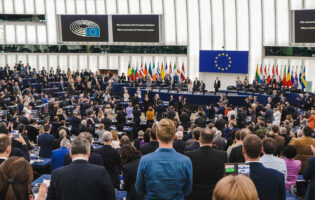Germany’s Historical Euro Responsibility

James D. Bindenagel
University of Bonn
James D. Bindenagel is a retired U.S. Ambassador, Henry-Kissinger-Professor (Emeritus) at Bonn University, and Senior Non-Resident Transatlantic Fellow at the German Marshall Fund of the United States. He has published: Germany: From Peace to Power? Can Germany Lead in Europe without Dominating it? (2020) and International Sicherheit im 21. Jahrhundert, Deutschlands Verantwortung (2015), both published by V&R Bonn for Bonn University.
J. D. Bindenagel is a former U.S. Ambassador and is currently the Vice President at DePaul University in Chicago. This Op-Ed originally appeared in Süddeutsche Zeitung on January 12, 2012.
Click here to read the original German version from Süddeutsche Zeitung
The Eurocrisis is reminiscent of two European conflagrations lasting three decades, the Thirty Years War (1618-1648) and the two twentieth century World Wars (1914-1945)[i] Those wars centered on Germany and ravaged Europe and the world. The current Eurocrisis centers on Germany and is an existential crisis about European Union political integration. Chancellor Angela Merkel explained to her Party Congress in Leipzig, without exaggeration, that “if the euro falls, Europe falls.” She described the challenge as “the most difficult since the Second World War.” That is no exaggeration.
The Treaty of Westphalia ended a devastating territorial and religious armed conflict with agreement establishing the principle of “Sanctity of Sovereignty” which governed international relations for the next four centuries. After the Second World War ended, the United Nations was formed and the U.N. Universal Declaration on Human Rights has guided international relations. Europe now faces the Eurocrisis, and Germans have surprisingly strong support from Polish Foreign Minister Radek Sikorski, who has likened the Eurocrisis to war.
In his Berlin speech on November 28, 2011 he recalled an interview he had with the then-chairman of the Republican Bank of Croatia in Yugoslavia. The banker told him in the beginning of the 1990’s that the parliament of Serbia had just voted to print unauthorized amounts of the common currency, Dinars. The banker said to Sikorski: “This is the end of Yugoslavia.” As the Dinar zone collapsed so did Yugoslavia.” The horrendous fate of Yugoslavia, Sikorski continued, reminds us that money, as well as being a technical device, a ‘means of exchange’, symbolizes unity – or disunity.”[ii]
Sikorski also quoted German philosopher Jürgen Habermas: “If the European project fails, then there is the question of how long it will take to reach the status quo again. Remember the German Revolution of 1848: When it failed, it took us 100 years to regain the same level of democracy as before.’” Sikorski then challenged Chancellor Merkel: “I fear German power less than I am beginning to fear German inactivity. You have become Europe’s indispensable nation. You may not fail to lead. Not dominate, but to lead in reform.”[iii]
Whether the EU will be successful in the long run depends on European political leadership has the political will to achieve political union. Germany needs to lead. Historically, failure has been the rule. Pierre Werner’s 1970 monetary union plan to create a European Economic and Monetary Union failed for lack of political will.
European leaders descended on Bremen for a re-launched effort in July 1978. U.S. President Carter’s budget cuts, credit controls and monetary tightening took the world’s economy into a nose dive and for Europeans promised themselves a European Monetary System to find protection from the dollar’s volatility. For Helmut Schmidt, the 1970’s search for EMU was far more than one for a currency bloc; it was the future of Germany in Europe. In the 1980’s Chancellor Kohl and President Mitterrand continued the discussion. Linking European monetary policy to German unification, Mitterrand promised Germany his full support for German security. In early 1983 Mitterrand spoke to the Bundestag in favor of deployments of American Intermediate Range Nuclear Forces (INF) in Germany, and Chancellor Kohl won parliamentary approval for those then. France, in turn, looked for German support for a common European monetary policy.[iv] French President Mitterrand’s support for German security unification came with the expectation of German support for EMU.
After the fall of the Berlin Wall on November 9, 1989 Kohl became preoccupied by East Germany and German unification. While the struggle for monetary union took a back seat for Kohl, Mitterrand wanted to embed Germany in the EU with the monetary union as a result of unification. At first, he encouraged a slow unification process and sought support from Soviet President Michal Gorbachev and Prime Minister Margret Thatcher. He told Kohl bluntly: “Without a common currency, we are all of us … already subordinate to the Germans’ will.”[v] Mitterrand pressured Kohl to accept EMU and “called on Germany to agree to serious negotiations on Economic Monetary Union before the end of 1990. Otherwise … Germany risked a ‘Triple Alliance” between France, Britain and the Soviet Union that could isolate Germany.” [vi]
During unification negotiations, Kohl told U.S. Secretary of State James A. Baker, III that he would support EMU, “although it was not in German interests.”Kohl argued for the need for a European political union as part of the EMU. [vii] The issue faded as German unification became inevitable. By October 3, 1990 German political union had been achieved by a vote of the Volkskammer acceding to the West German Basic Law under the then Article 23. Eventually, after German unification, the 1992 Maastricht Treaty set down the plan for the Single Market and for European Monetary Union. German commitment to European integration was added to the German constitution (a new Article 23 of the Basic Law). [viii]
Over the past two decades, united Germany has accepted its political EU integration responsibility to move toward EMU, to introduce the euro, and now to resolve the current Eurocrisis. There is little doubt that Germany is obligated to support EU integration, constitutionally, historically, and morally. This existential crisis is fundamentally about European integration – pooling sovereignty for a common fiscal and monetary policy — and without a resolution, EU disintegration could lead to the resurgence of national interests at the expense of European Union institutions. Of course the solution is also dependent on private global investors and the European Central Bank (ECB); European policy-makers degree of control is constrained. Nevertheless, the role of Germany and its politics are the center attraction in the drama, and all the world is watching Berlin.
Germany’s proposal seems fixated on a new treaty to put in place tough limits on deficits through austerity regimes and constitutional balanced budget amendments in each country, which in the short term the market considers irrelevant and in the long term likely to make things worse. The Euro problem is not only one of austerity in the South of Europe, but also one of trade balance adjustments in the surplus countries, particularly Germany.
If even the committed Euro-skeptic Martin Feldstein writing in the latest Foreign Affairs magazine can admit that the “Eurozone is likely to continue with almost all its current members,”[ix] European leaders can certainly decide that countries as diverse in political and social culture, productivity and taxation as the Eurozone members can come together to establish finally a European Monetary Union with the Euro as its currency. That union agreement will set the path for a more integrated Europe for the next century.
[i] Wolfgang Muenchau in the Financial Times and Helmut Schmidt, Speech: “Rede Helmut Schmidt auf dem SPD-Bundesparteitag am 4. Dezember 2011 in Berlin.
[ii] Sikorski, Radek, Foreign Minister of Poland, Speech: “Poland and the future of the European Union”, DGAP, Berlin, 28 November 2011
[iii] Sikorski
[iv] Marsh, David, The Euro, p.99.
[v] Marsh, p. 135.
[vi] Marsh, David, The Euro, p.99.
[vii] Marsh, p. 137
[viii] Schmidt, Helmut, Speech: “Rede Helmut Schmidt auf dem SPD-Bundesparteitag am 4. Dezember 2011 in Berlin.
[ix] Feldstein









